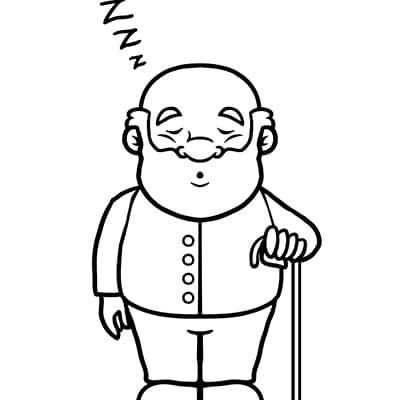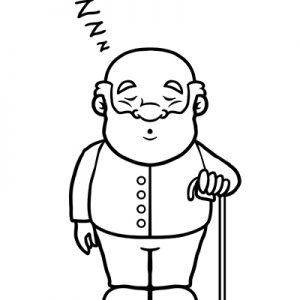 What can we do to help the elderly get a restful night’s sleep?
What can we do to help the elderly get a restful night’s sleep?
Sleep, much like air, water or food, is essential for life…
Everyone experiences an occasional restless night which can make us feel a bit grumpy and not at our best but persistent sleepless nights can have a significant impact on someone’s quality of life, in the short and long term. Poor sleep can affect memory and concentration and increase the risk of accidents and falls. Regular lack of sleep (six hours or less a night), known as insomnia, has been associated with serious medical conditions, including obesity, heart disease and diabetes.
It’s now clear that continuous, uninterrupted sleep is essential for a long and healthy life. Sleep disorders affect nearly half of adults aged 65 and over, and appear to be more common in women than men.
How much sleep do we need as we age?
Most adults need around eight hours a night to function properly, but individual needs vary. Although some believe that we need less sleep as we age, in fact our sleep requirements stay constant throughout adult years. However, changes to our sleep patterns or ‘sleep architecture’ are part of the normal ageing process, and quality of sleep tends to deteriorate. Also, natural changes in circadian rhythms in the body that coordinate the timings of certain functions, including sleep, may make older people feel sleepier earlier in the evening and wake up earlier the next morning. This may be the reason why daytime napping is common among older adults.
Possible causes of insomnia
Those in poorer health tend to have more sleep problems which can be a symptom of the condition itself or a side effect of prescribed medications. Health conditions that are well recognised to directly affect sleep include sleep obstructive apnoea (pauses of breathing during sleep) and restless leg syndrome. Other problems include snoring and the increased need to urinate during the night, as well as psychological issues such as stress, depression and dementia. Poor sleep habits, such as a poor sleeping environment or eating a heavy meal near bedtime, as well as consumption of alcohol and stimulants like coffee and nicotine, can also lead to a bad night’s sleep.
Can diet help promote sleep?
Traditionally certain foods and drinks have been consumed to help promote a good night’s sleep. For example, warm milk has long been associated with inducing sleepiness. This may be because a warm drink before bedtime increases body temperature which is thought to aid sleep or due to the psychological association reminding us of being given warm milk at bedtime as a child. Another reason may be that it contains the essential amino acid tryptophan which is involved in the production of melatonin (the sleep hormone). Melatonin regulates circadian rhythms and is secreted at night to induce and regulate sleep. Levels of melatonin tend to decrease with age which may be a cause of reduced quality of sleep and other sleep disturbances in older adults. Melatonin is also found in milk, and cows that are milked during the night have been shown to produce milk with high levels of both tryptophan and melatonin. A study conducted in healthy older adults in care homes showed that ‘night milk’ improved sleep quality and resulted in better daytime activity, so ‘night milk’ before bed may help to promote a good night’s sleep older adults. Supplements of tryptophan and melatonin may also help ameliorate sleep disturbances and disorders; however studies show that they should only be administered in the short term to help restore the circadian rhythm, and advice by a health professional should be sought before taking them.
Some examples of other foods or drinks that have been considered to help influence sleep are kiwi fruit, cherry juice, turkey and chamomile tea. Whilst these associations are mostly based on anecdotal or limited evidence, this is an active area of research and studies are emerging to show, for example, that tart cherry juice may have promising effects on enhancing sleep in older adults. However, more research is needed before we can make any strong recommendations that these foods or drinks may help promote sleep quality.
As well as timings of meals impacting on sleep, sleep patterns and duration have also been shown to influence diet and meal patterns. People who sleep less are more likely to have irregular meal patterns, consume energy-rich foods, have lower intakes of fruit and vegetables, and snack more frequently than those who sleep more. Skipping breakfast is more common in people who have a lower sleep duration, and among those who work night shifts or lead nocturnal lifestyles, as they tend to replace meals with snacks and consume most of their food in the later evening and at night. An unhealthy diet is associated with shorter sleep duration and irregular sleeping patterns but it isn’t clear whether this is a factor in their poor sleeping habits or whether they are just eating unhealthily as they are too tired to prepare healthier meals.
What is clear is that older adults need to consume a balanced, varied diet that contains plenty of starchy foods, particularly wholegrains, fruit and vegetables, lean protein foods and low fat dairy foods to provide a range of nutrients that are important for good health and that may help to improve sleep.
Helping the elderly in care homes achieve sleep – NICE guidelines
It is important that any health issues causing sleep disturbances are determined and treated accordingly. It is also essential that carers help residents to meet their sleep requirements. Earlier this year, NICEpublished a brief to help care homes under local authorities and partner organisations which aimed to support people living in care homes to retain their independence and identity. This includes making sure that residents are given as much choice as possible about their personal routines such as when they eat or sleep emphasising that the person’s needs should come before what is most convenient for the home. For more information seeNICE.
The good news is that there are some easy steps that carers can do to help residents in care homes get enough sleep for good health.
Some tips to help encourage a good night’s sleep:
- Discourage caffeine, nicotine, and alcohol within 6 hours of going to bed or suggest complete elimination of caffeine from the diet if residents are struggling to sleep.
- Provide a regular routine at bedtimes.
- Help residents to establish fixed times for going to bed and waking up (and avoid sleeping in after a poor night’s sleep).
- Encourage residents to relax before going to bed.
- Maintain a comfortable temperature in bedrooms.
- Minimise light and noise exposure in bedrooms as much as possible.
- Provide a light snack or warm drink if residents are hungry or thirsty before bed.
- Do not offer heavy meals at bedtime.
- Although it is important to encourage residents to be as physically active as possible, discourage exercise within 4 hours of bedtime.
Helena Gibson-Moore, British Nutrition Foundation – Nutrition Scientist



 What can we do to help the elderly get a restful night’s sleep?
What can we do to help the elderly get a restful night’s sleep?


